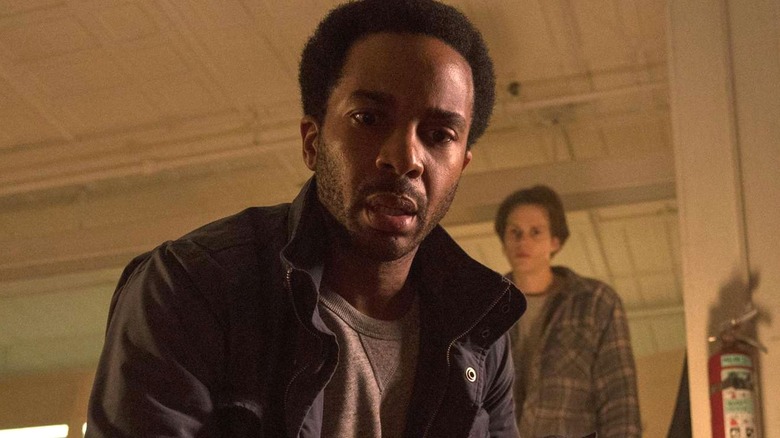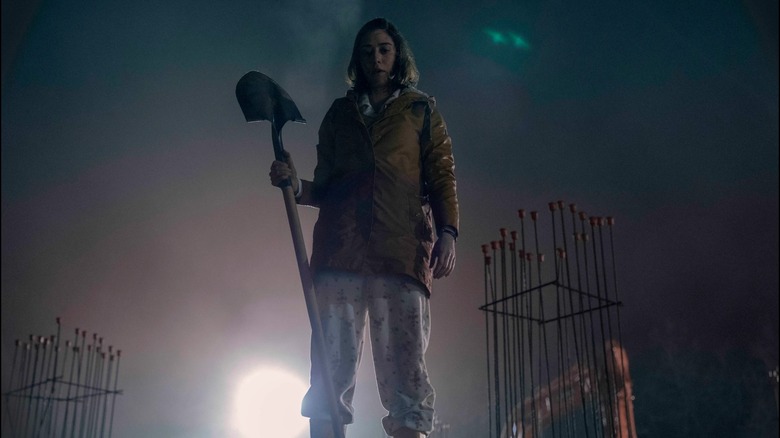Hulu’s “Castle Rock” ran for two brilliant seasons, etching a haunting arc of stories that capture exactly why Stephen King’s works of horror scare us. While there were no active expectations for a third season, the horror anthology series was canceled by the network in late 2020. The reasons for this are twofold: firstly, there were never any plans to prolong the series beyond two seasons, and secondly, producer Warner Bros. TV had turned its attention to HBO Max, which was a relatively new offshoot at the time. Moreover, the COVID-19 pandemic might’ve played an unwitting role here, as a slew of other Hulu titles were also canceled around the same time, including “High Fidelity” and “Runaways.”
Even though the show’s cancellation was somewhat expected, more seasons of “Castle Rock” would’ve only worked in the show’s favor. Showrunners Sam Shaw and Dustin Thomason understood that King’s appeal lies in a variety of stories that evoke the horror in the mundane, where everyday situations suddenly morph into something grotesque. After all, the term Castle Rock isn’t a reference to a particular Stephen King work — it is a fictional town that haunts King’s version of Maine throughout his oeuvre. Sporting a small population, Castle Rock has appeared in several stories (from “The Dead Zone” to “Needful Things”), where its terrain is underlain by limestone and often hides a horrifying underbelly that reveals itself when you least expect it.
Given the liminality of this town, much like the concept of “The Twilight Zone” (where reality and fantasy meet in an extradimensional space), Castle Rock is a source of horror that conveys feelings of discomfort. The Hulu series channels this energy through stories that highlight King’s most compelling authorial impulses, where character complexity works hand in hand with supernatural horrors to reveal the worst in humanity. With that in mind, let’s dig deeper into what makes “Castle Rock” stand out as a Stephen King adaptation.
Castle Rock is a (mostly) seamless horror anthology with stellar performances
King’s work (which includes countless novels, novellas, and short stories) often references each other, hints at shared universes, or nudges towards a universal sense of evil that casts a shadow over different worlds. The cursed town of Castle Rock serves as the perfect setting for these stories to come to life in the Hulu series, which weaves an original yarn out of some of the most revered horror stories written in the postmodern era.
The series establishes two major events before diving straight into the heart of the tale, namely the disappearance of a child who mysteriously resurfaces after 11 days, and the death of his father soon after. The harrowing tone of this prologue immediately rewires our expectations for “Castle Rock,” as the follow-up events set in Shawshank Prison in the present day aren’t lighthearted or comforting in the slightest.
What’s worse, these present-day developments feed directly into our understanding of the missing kid incident in 1991, reforging our perception of how deep the rabbit hole goes. Amid direct references to “Salem’s Lot” or “Misery” (which are bound to make avid King enthusiasts happy), a deeper bond is forged with the author’s vast body of work, along with the morbid themes that connect these disparate stories. What we’re left with is a tight mystery box brimming with hyper-specific references, callbacks, and allusions, as the series is in no rush to unravel suspense or spring unearned scares on its audience. “Castle Rock,” however, isn’t just for those intimately acquainted with King’s work, as its hypnotic appeal caters to anyone with an interest in the eeriness of small towns and the horrors hidden underneath its idyllic facade.
Even when the threads of reimagined terror start to stretch too much in “Castle Rock,” committed performances help ground even the most outlandish reveals. Any other flaws are quite easy to overlook, as the series keeps up the momentum throughout its second and final season by taking a more standalone approach to the anthology format. The second season, however, isn’t suited for those expecting quick reveals or supernatural violence, as it takes a more indirect, drawn-out approach to the riveting tale it tells. If you’re on board with that, “Castle Rock” is bound to pleasantly surprise you with its startling originality even as it bases its existence on King’s fictional mythos.










